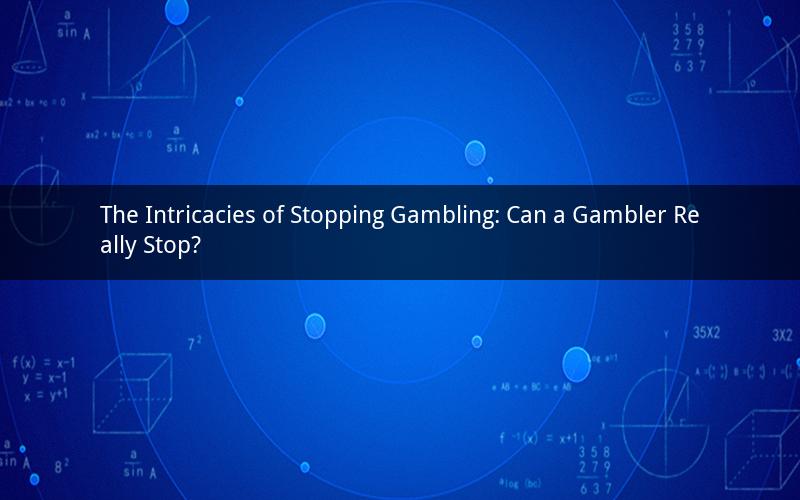
Introduction:
Gambling has been a part of human culture for centuries, captivating individuals with its allure and promise of fortune. However, the dark side of gambling often leads to addiction, causing immense suffering for both the gambler and their loved ones. The question that haunts many is, "Can a gambler really stop gambling?" This article delves into the complexities surrounding this issue, exploring the factors that contribute to gambling addiction and the potential paths to recovery.
1. Understanding Gambling Addiction:
Gambling addiction, also known as pathological gambling, is characterized by an inability to control gambling behavior despite negative consequences. It is a complex disorder with various underlying factors, including psychological, social, and environmental influences. Understanding these factors is crucial in determining whether a gambler can stop gambling.
1.1 Psychological Factors:
Psychological factors play a significant role in the development of gambling addiction. Individuals who have a predisposition towards impulsivity, thrill-seeking, and risk-taking behaviors are more susceptible to developing gambling problems. Additionally, individuals with low self-esteem or a history of trauma may turn to gambling as a form of escapism or self-medication.
1.2 Social Factors:
Social factors, such as peer pressure, family environment, and exposure to gambling, can also contribute to the development of gambling addiction. Individuals who grow up in a culture that promotes gambling or have friends who engage in excessive gambling may be more prone to developing gambling problems.
1.3 Environmental Factors:
The availability of gambling opportunities, such as casinos, online platforms, and sports betting, can create a conducive environment for gambling addiction. Easy access to gambling venues and the constant availability of gambling options can make it challenging for individuals to control their gambling behavior.
2. The Challenges of Stopping Gambling:
The journey towards stopping gambling is fraught with challenges. Here are some of the common obstacles faced by individuals struggling with gambling addiction:
2.1 Cognitive Dissonance:
Cognitive dissonance occurs when individuals hold conflicting beliefs or attitudes. Gamblers often experience this when they acknowledge the negative consequences of their gambling but continue to engage in the behavior. This internal conflict can make it difficult for them to stop gambling.
2.2 Financial Consequences:
The financial consequences of gambling addiction can be devastating. Individuals may accumulate significant debt, lose their homes, or face legal repercussions. The fear of financial ruin can make it challenging for gamblers to seek help and stop gambling.
2.3 Emotional and Psychological Factors:
Gamblers often experience intense emotions, such as anxiety, depression, and guilt, as a result of their gambling behavior. These emotions can create a powerful urge to gamble, making it difficult to break the cycle of addiction.
3. Paths to Recovery:
While the journey towards stopping gambling may be challenging, there are several paths to recovery that can help individuals overcome their addiction:
3.1 Professional Help:
Seeking help from a mental health professional is an essential step in the recovery process. Therapists, counselors, and addiction specialists can provide personalized support and guidance tailored to the individual's specific needs.
3.2 Support Groups:
Support groups, such as Gamblers Anonymous, offer a sense of community and understanding for individuals struggling with gambling addiction. Sharing experiences and receiving encouragement from others who have faced similar challenges can be incredibly beneficial.
3.3 Self-Reflection and Self-Regulation:
Engaging in self-reflection and developing self-regulation skills can help individuals gain control over their gambling behavior. This may involve setting personal boundaries, identifying triggers, and developing healthier coping mechanisms.
3.4 Financial Management:
Addressing the financial consequences of gambling addiction is crucial for long-term recovery. Seeking financial counseling, creating a budget, and exploring debt management options can help individuals regain financial stability.
Conclusion:
The question of whether a gambler can really stop gambling is complex and multifaceted. While the journey towards recovery is challenging, it is possible for individuals to overcome their addiction with the right support and resources. Understanding the underlying factors contributing to gambling addiction, addressing the challenges of stopping gambling, and exploring the various paths to recovery can empower individuals to take control of their lives and break free from the grip of addiction.
Questions and Answers:
1. Q: Can a person overcome gambling addiction on their own?
A: While it is possible for some individuals to overcome gambling addiction on their own, seeking professional help and joining support groups can significantly enhance the chances of successful recovery.
2. Q: Is there a specific treatment approach that works best for gambling addiction?
A: The most effective treatment approach for gambling addiction varies from person to person. A combination of therapy, support groups, and self-help strategies often yields the best results.
3. Q: Can family members play a role in the recovery process?
A: Yes, family members can play a crucial role in the recovery process. They can provide emotional support, encourage the individual to seek help, and create a supportive environment that promotes recovery.
4. Q: How long does it take to recover from gambling addiction?
A: The duration of recovery from gambling addiction varies depending on the individual's circumstances and the severity of their addiction. Some individuals may experience immediate relief, while others may require ongoing support and treatment for an extended period.
5. Q: Can gambling addiction lead to other mental health issues?
A: Yes, gambling addiction can be associated with other mental health issues, such as depression, anxiety, and substance abuse disorders. It is essential for individuals struggling with gambling addiction to address all underlying mental health concerns for a comprehensive recovery.